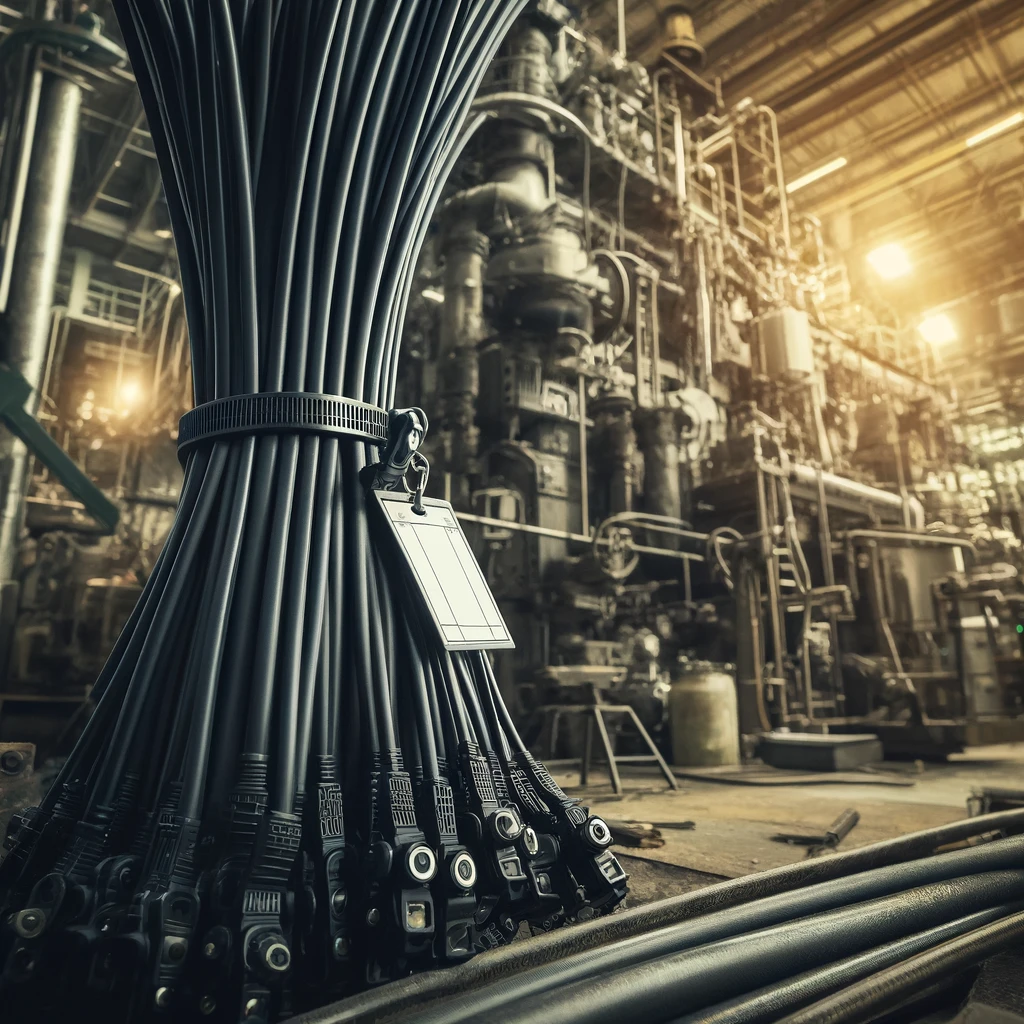Cable ties are versatile fasteners that secure and organize wires, cables, and hoses in various settings. They come in different sizes, materials, and strengths to cater to specific applications.
When it comes to industrial plants and machinery, the choice of cable ties becomes crucial. These environments often involve harsh conditions, extreme temperatures, and exposure to chemicals or UV radiation. Let's explore whether regular cable ties are suitable for such demanding applications.
Understanding the Differences Between Regular and Industrial-Grade Cable Ties
Regular ties, also known as standard or general-purpose ties, are commonly used in everyday applications. They are made from nylon or plastic materials and offer a cost-effective solution for bundling and organizing wires and cables. These ties are suitable for light-duty tasks in office spaces, homes, or non-critical areas.
On the other hand, industrial-grade cable ties are specifically designed to withstand the rigors of industrial environments. They are manufactured using high-quality materials like stainless steel, heat-stabilized nylon, or UV-resistant plastics.
These ties offer superior strength, durability, and resistance to harsh conditions, making them ideal for use in industrial plants and machinery.
Key Factors to Consider When Choosing Ties for Industrial Applications
Strength and durability
Industrial plants and machinery often involve heavy-duty applications that require robust fastening solutions. Regular ties may not provide the necessary strength and durability to withstand the stresses and strains encountered in these environments.
Industrial-grade ties, on the other hand, are engineered to offer higher tensile strength and resistance to breakage, ensuring a secure and reliable hold.
Temperature resistance
Industrial settings can expose ties to extreme temperatures, ranging from freezing cold to scorching heat. Regular cable ties may become brittle or degrade when subjected to such temperature fluctuations.
Industrial-grade ties are formulated to withstand a wide temperature range, typically from -40°C to +85°C or higher, depending on the material. This ensures that the ties maintain their integrity and performance even in challenging thermal conditions.
Chemical resistance
Industrial environments often involve exposure to various chemicals, oils, and solvents. These substances can cause regular zip ties to deteriorate, weaken, or even dissolve over time.
Industrial-grade ties are made from materials that offer excellent chemical resistance, such as stainless steel or specially formulated plastics. They can withstand exposure to harsh chemicals without compromising their strength or functionality.
UV resistance
Outdoor industrial applications or areas exposed to sunlight require zip ties that can withstand UV radiation. Regular zip ties may become brittle, discolored, or lose their strength when exposed to prolonged UV exposure.
Industrial-grade zip ties, particularly those made from UV-stabilized materials, are designed to maintain their properties and performance even under direct sunlight or UV exposure.
Choosing the Right Industrial-Grade Cable Ties

When selecting zip ties for industrial plants and machinery, it's essential to consider the specific requirements of the application. Factors such as the size and weight of the bundles, the environmental conditions, and the required tensile strength should be taken into account.
Manufacturers offer a wide range of industrial-grade zip ties to cater to different needs. For example, stainless steel zip ties are ideal for applications that demand high strength and corrosion resistance. Heat-stabilized nylon ties are suitable for high-temperature environments, while UV-resistant ties are perfect for outdoor installations.
It's also important to consider the ease of installation and removal when choosing industrial-grade zip ties. Some ties come with special features like low profile heads, smooth edges, or releasable mechanisms that facilitate efficient installation and maintenance.
Things to Avoid When Using Cable Ties in Industrial Settings
When using cable ties in industrial plants and machinery, there are several pitfalls to avoid. These mistakes can compromise the integrity of the fastening solution and lead to potential safety hazards or equipment failure.
Let's explore some key things to steer clear of when working with zip ties in industrial environments.
Choosing the Wrong Material
One common mistake is selecting zip ties made from inappropriate materials for the specific application. Regular plastic or nylon cable ties may not withstand the harsh conditions found in industrial settings.
Avoid using ties that are not rated for the temperature range, chemical exposure, or UV resistance required by the environment. Instead, opt for industrial-grade cable ties made from suitable materials like stainless steel or specialized plastics.
Underestimating the Required Strength
Another pitfall to avoid is underestimating the tensile strength needed for the application. Industrial plants and machinery often involve heavy loads and vibrations that can put significant stress on cable ties.
Using ties with insufficient strength can result in breakage or loosening over time. Always choose cable ties with a tensile strength rating that exceeds the anticipated load requirements to ensure a secure and reliable hold.
Ignoring Environmental Factors
Failing to consider the environmental factors present in industrial settings is another mistake to avoid. Cable ties exposed to extreme temperatures, chemicals, or UV radiation can degrade and lose their effectiveness. Avoid using regular cable ties in areas subject to these conditions.
Select industrial-grade ties specifically designed to withstand the environmental challenges present in the application. This ensures long-term performance and minimizes the risk of failure.
Improper Installation Techniques
Improper installation techniques can also lead to problems with cable ties in industrial environments. Avoid overtightening the ties, as this can cause stress on the cables or even damage the tie itself. Use the appropriate tools and follow the manufacturer's guidelines for proper installation.
Additionally, avoid leaving sharp edges exposed, as they can pose a safety hazard or cause damage to nearby components. Trim the excess length of the tie flush with the head to maintain a clean and safe installation.
Neglecting Regular Inspections and Maintenance
Finally, neglecting regular inspections and maintenance of cable ties in industrial settings is a mistake to avoid. Over time, cable ties can become loose, damaged, or degraded due to the harsh conditions they are subjected to.
Establish a routine inspection schedule to check the condition of the ties and identify any signs of wear or damage. Replace ties that show signs of deterioration or have reached the end of their service life. Regular maintenance ensures the ongoing integrity and safety of the cable tie installations.
Conclusion
In conclusion, regular zip ties are not recommended for use in industrial plants and machinery. These environments demand fastening solutions that can withstand harsh conditions, extreme temperatures, chemical exposure, and UV radiation. Industrial-grade cable ties, specifically designed for such applications, offer the necessary strength, durability, and resistance to ensure reliable and long-lasting performance.
Check out Cable Ties Unlimited for more information on best industrial grade cable ties on the market.

